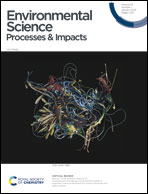Ecotoxicological effect of enrofloxacin on Spirulina platensis and the corresponding detoxification mechanism†
Abstract
Enrofloxacin is a widely used antibiotic targeting DNA gyrase and has become the commonly detected micropollutant in aquatic environments. Thus, the potential toxicity of enrofloxacin to Spirulina platensis which is a kind of prokaryote similar to Gram-negative bacteria has been hypothesized. However, little is known about the toxicity and degradation mechanism of enrofloxacin during the growth process of Spirulina platensis. Herein, the biomass accumulation of Spirulina platensis was stimulated to 115% of the control group by 0.1 mg L−1 enrofloxacin (10th day), which could be removed probably through the metabolism. Further increasing the enrofloxacin level to 5.0 mg L−1 almost inhibited the growth and remediation ability of Spirulina platensis for 35 days. Environmental stress also caused the variations of photosynthetic pigments (chlorophyll a and carotenoids) and primary biocomponents (proteins, lipids, and carbohydrates), reflecting the adaptation of Spirulina platensis for handling the negative effects of enrofloxacin. The detoxification mechanism was studied by identifying the degradation products of enrofloxacin, suggesting the occurrence of dealkylation and oxidation reactions primarily at the piperazine group. The decreased antimicrobial activity was confirmed by the reduced binding affinity of degradation products with enzymes. The obtained results could help us understand the role of enrofloxacin in the growth of Spirulina platensis, thus providing great support for employing Spirulina platensis in risk assessment and hazard reduction.

- This article is part of the themed collection: Contaminant remediation and fate


 Please wait while we load your content...
Please wait while we load your content...